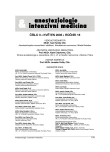-
Články
- Vzdělávání
- Časopisy
Top články
Nové číslo
- Témata
- Kongresy
- Videa
- Podcasty
Nové podcasty
Reklama- Kariéra
Doporučené pozice
Reklama- Praxe
Selective Decontamination of the Digestive Tract:Why Don’t We Apply Evidence in Practice?
Autoři: Van Saene H. K. F. 1; L. Silvestri 2; De La Cal M. A. 3
Působiště autorů: Department of Medical Microbiology, University of Liverpool, UK 1; Department of Anaesthesia and Critical Care, Gorizia Hospital, Italy 2; Department of Critical Care Medicine, Getafe Hospital, Madrid, Spain 3
Vyšlo v časopise: Anest. intenziv. Med., 16, 2005, č. 3, s. 152-160
Kategorie: Intenzivní medicína - Souborný referát
Souhrn
Selective decontamination of the digestive tract [SDD] has been assessed in 54 randomised controlled trials (RCTs) and nine meta-analyses of RCTs only.The most recent meta-analysis includes 36 RCTS in 6,922 unselected patients, and shows that SDD, including enteral and parenteral antimicrobials, reduces the odds ratio for pneumonia to 0.35 [0.29 to 0.41], and mortality to 0.78 [0.68 to 0.89]. The absolute mortality reduction was 4.8%. This information implies that 5 ICU-patients need to be treated with SDD to prevent one case of pneumonia, and 21 ICU-patients need to be treated to prevent one death. Two recent large RCTs report an absolute mortality reduction of 8%, corresponding to the treatment of 12 patients with SDD to save one life. The 54 RCTs and the nine meta-analyses do not provide data for a link between SDD and antimicrobial resistance. The Cochrane Library meta-analysis reports that SDD does not lead to resistance amongst aerobic Gram-negative bacilli but, even better, the addition of enteral polymyxin/tobramycin to the parenteral antimicrobials reduces resistance compared with the parenteral antibiotics only. This is in line with a previous RCT demonstrating that enteral antimicrobials control extended spectrum beta-lactamase producing Klebsiella. Antimicrobial resistance, being a long-term issue, has been evaluated in eight studies monitoring antimicrobial resistance between two and seven years, and bacterial resistance associated with SDD has not been a clinical problem. Costs can hardly be a major concern for a manoeuvre of 6 Euros a day that reduces pneumonia by 65%, and mortality by 22% without antimicrobial resistance emerging in unselected patients. These data support level 1 evidence for SDD, allowing a grade A recommendation. The main reason for SDD not being widely used is the primacy of opinion over evidence.
Key words:
SDD (selective decomination of the digestive tract – infection in the ICU – evidence – CDC labels
Štítky
Anesteziologie a resuscitace Intenzivní medicína
Článek vyšel v časopiseAnesteziologie a intenzivní medicína
Nejčtenější tento týden
2005 Číslo 3- Jak souvisí postcovidový syndrom s poškozením mozku?
- Perorální antivirotika jako vysoce efektivní nástroj prevence hospitalizací kvůli COVID-19 − otázky a odpovědi pro praxi
- Metamizol v léčbě různých bolestivých stavů – kazuistiky
- Neodolpasse je bezpečný přípravek v krátkodobé léčbě bolesti
- Léčba akutní pooperační bolesti z pohledu ortopeda
Nejčtenější v tomto čísle- Preemptivní analgezie ketaminem a morfinem – klinická studie
- Intoxikácia paracetamolom – kazuistika
- Vliv velké břišní chirurgie na intraabdominální tlak a na perfuzi splanchnických orgánů
- Selective Decontamination of the Digestive Tract:Why Don’t We Apply Evidence in Practice?
Kurzy
Zvyšte si kvalifikaci online z pohodlí domova
Autoři: prof. MUDr. Vladimír Palička, CSc., Dr.h.c., doc. MUDr. Václav Vyskočil, Ph.D., MUDr. Petr Kasalický, CSc., MUDr. Jan Rosa, Ing. Pavel Havlík, Ing. Jan Adam, Hana Hejnová, DiS., Jana Křenková
Autoři: MUDr. Irena Krčmová, CSc.
Autoři: MDDr. Eleonóra Ivančová, PhD., MHA
Autoři: prof. MUDr. Eva Kubala Havrdová, DrSc.
Všechny kurzyPřihlášení#ADS_BOTTOM_SCRIPTS#Zapomenuté hesloZadejte e-mailovou adresu, se kterou jste vytvářel(a) účet, budou Vám na ni zaslány informace k nastavení nového hesla.
- Vzdělávání



